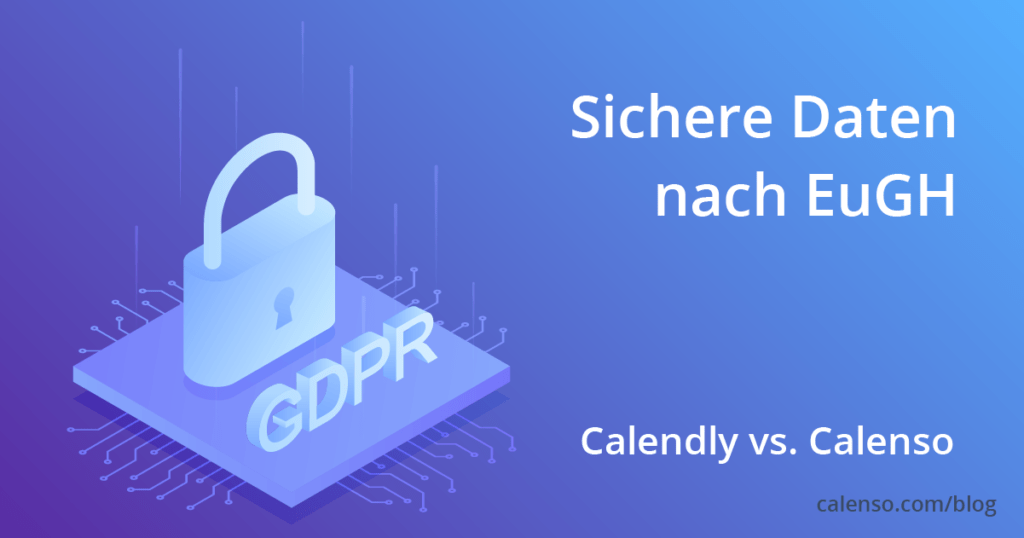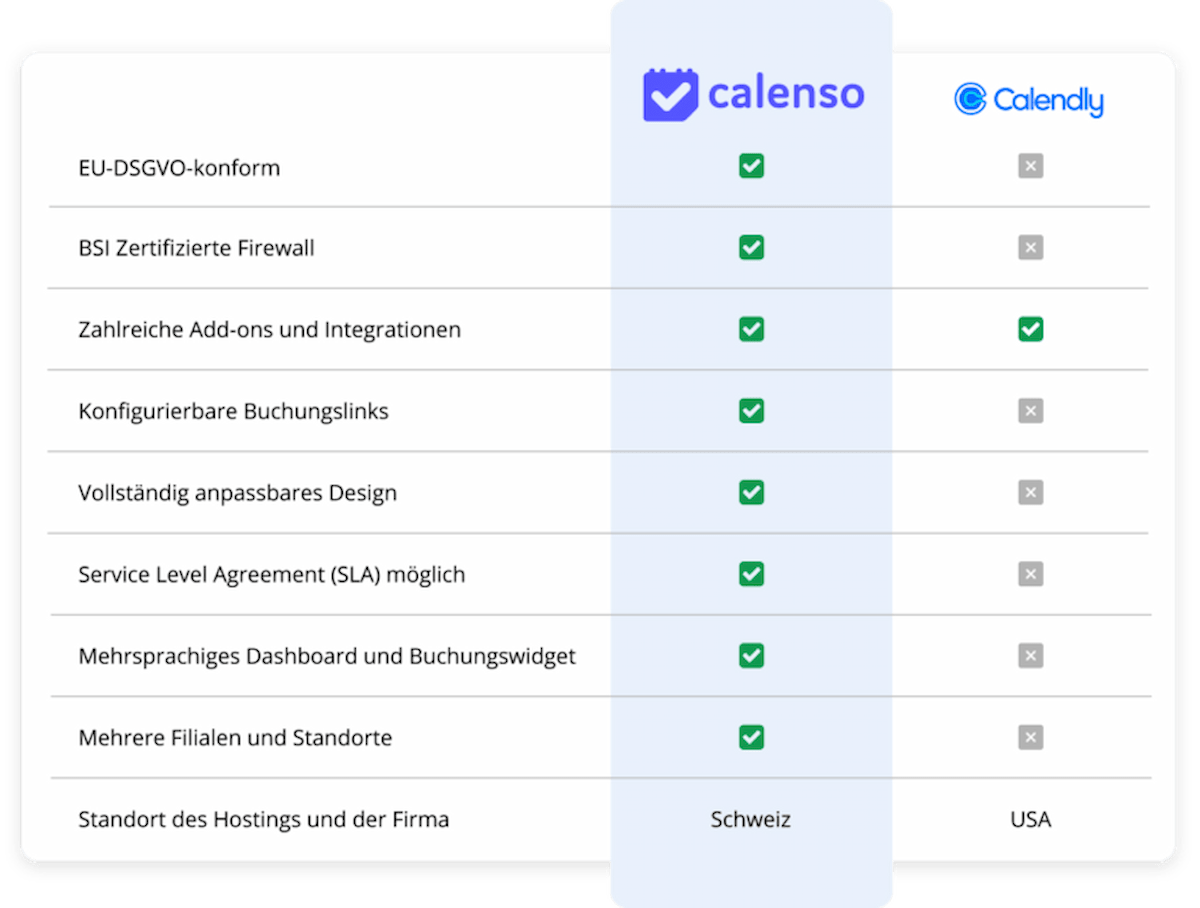Terminvereinbarungstools bieten oft ähnliche Funktionen an, welche auf die Bedürfnisse der Kundschaft ausgerichtet sind. Diese Terminvereinbarungstools kommen aus der ganzen Welt, wobei für ein Unternehmen aus dem europäischen Wirtschaftsraum (EWR) nur die Nutzung von us-amerikanischen Tools problematisch ist. Mit dem Europäischen Gerichtshofurteil (EuGH) vom 16. Juli 2020 stehen viele Nutzer von us-amerikanischen Tools wieder vor der Tatsache, dass diese aufgrund des Datenschutzes der Kunden nicht weiter genutzt werden dürfen.1 Mögliche Verträge wie US-Privacy-Shield werden nicht weiter unterstützt. Deshalb müssen us-amerikanische Anbieter auf europäische Serverstandorte zurückgreifen, um eine Datenverarbeitung im EWR zu gewährleisten.
Grosse Terminvereinbarungs Softwareanbieter wie Calendly haben Schwierigkeiten, den neuen Anforderungen gerecht zu werden. Calendly zählt über eine Vielzahl von Nutzern aus dem EWR, ist aber selbst ein us-amerikanisches Unternehmen. Ihre Nutzer müssen nun einen neuen Anbieter finden, um die Daten ihrer Kunden zu schützen. Calenso deckt die Funktionalitäten von Calendly mehrheitlich ab und übertrifft diese vom Umfang und der Individualisierung. Das wichtigste zuerst: Calenso ist als Schweizer Unternehmen DSGVO konform. Zudem gilt die Schweiz als Drittstaat gegenüber von der EU, jedoch gilt die Schweiz für die EU als angemessen im Umgang mit der Verarbeitung von personenbezogenen Daten. Sieh dir in der nachfolgenden Übersicht den Funktionsvergleich von Calenso und Calendly an.
Alle Informationen zum Wechsel oder dem Vergleich mit Calendly findest du hier.
Von Calendly zu Calenso wechseln
Aufgrund des EuGH Urteiles empfiehlt es sich, von einem us-amerikanischen Anbieter zu einem Anbieter aus dem EWR zu wechseln. Leider ist der Wechsel oft zeitaufwändig, jedoch riskieren Unternehmen eine hohe Geldstrafe, sofern weiterhin ein Datenaustausch mit der USA vorhanden ist. Calenso besitzt alle grundlegenden Funktionen von Calendly und darüber hinaus noch viele mehr. Sieh dir hier alle Funktionen von Calenso in der Auflistung an. Und: Calenso hat einen sehr hohen Datenschutz und den Serverstandort in der Schweiz. Nach einem Testlauf mit Calendly mussten wir leider feststellen, dass es keinen direkten Datenexport für das Profil gibt. Es gibt auch keine Alternative, die Daten aus Calendly herunter zu laden. Falls du von einem anderen Tool mit der Möglichkeit eines Datenexportes zu Calenso wechseln möchtest, kannst du die Daten ganz einfach in Calenso importieren. Somit geht nichts verloren. Wechsle heute noch zu Calenso!
Wieso ist die Datenübertragung in die USA ein Problem?
Es gibt zwei verschiedene Hauptansatzpunkte, welche mit der Datenübertragung in der USA problematisch sind. Einerseits werden heutzutage auf Webseiten verschiedene Tools installiert, welche im Hintergrund und ohne aktives Wissen des Nutzers agieren. Falls jemand beispielsweise auf einer Webseite surft, welche ein sogenanntes Facebook-Pixel installiert hat, übermittelt die Person als Nutzer dieser Webseite Daten an Facebook, obwohl sie/er selbst kein/e Facebook-NutzerIn ist. Deshalb gilt hier der Grundsatz nicht “will ich nicht, nutz ich nicht”. Zweitens haben Behörden in der USA viel tiefere Anforderungen zu erfüllen, um gesammelte personenbezogene Daten von Unternehmen einzusehen. Im EWR steht es Behörden nicht frei, auf solche Daten zuzugreifen, in der USA (fast) uneingeschränkt.
Weil die Datenschutzanforderungen in Europa viel höher als in der USA sind, scheiterte neben dem Safe-Harbor-Abkommen nun auch das 2015 in Kraft getretene Privacy-Shield Framework. Diese zwei Abkommen stellten den Datenaustausch zwischen europäischen Standorten und der USA sicher, sodass der Austausch die gleichen Anforderungen genossen, wie der Datenaustausch innerhalb Europas. Das Safe-Harbor-Abkommen scheiterte nach der Snowden-Enthüllung. Diese zeigte, dass US-Behörden uneingeschränkt und ohne mögliche Anfechtung auf gespeicherte Daten von US-Unternehmen zugreifen konnten. Nun scheiterte kürzlich auch das Privacy Shield Framework, weil auch bei diesem Abkommen die Zugriffsrechte nicht eingeschränkt sind.
Fazit: Der Umgang der US-Behörden mit Daten aus Europa ist mit dem europäischen Datenschutz nicht konform. Persönliche Daten sind bei einem Datenaustausch insbesondere von europäischen Standorten mit den US-Mutterkonzernen nicht geschützt. Da bisher kein neues Abkommen getroffen wurde und die Situation durch COVID-19 verschärft ist, wird empfohlen, auf Anbieter mit einem Serverstandort in Europa zu wechseln. Es gibt weitere Alternativen, welche jedoch nicht ohne Risiko sind. Diese können im nachfolgenden Kapitel nachgeschlagen werden.
Mögliche Alternativen für ein EWR-Unternehmen
Als mögliche Alternative gelten unter anderem Standard Contractual Clauses (SCC), welche mit den Vorgaben der EU-Kommission konform sind. Der Datenschutz muss jedoch zwingend gewährleistet sein und der Vertrag kann nicht nur unterzeichnet werden. Weitere Informationen zum SCC können unter dem folgenden Link (Punkt 2 der wichtigsten Fragen) nachgelesen werden. Calenso empfiehlt Nutzern von US-Unternehmen auf alternative Anbieter aus dem EWR umzusteigen. Einerseits kann niemand vorhersagen, wie lange ein neues Abkommen halten würde und sich somit diese Frage erneut stellt. Andererseits ist der Datenschutz insbesondere in EU Ländern, sowie der Schweiz stabil und stark.
Registriere dich noch heute kostenlos bei Calenso und geniesse einen sorgenfreien Alltag mit der online Terminvereinbarung und ohne Gedanken zum Datenschutz.
Hier geht’s zum Datenschutz von Calenso!






